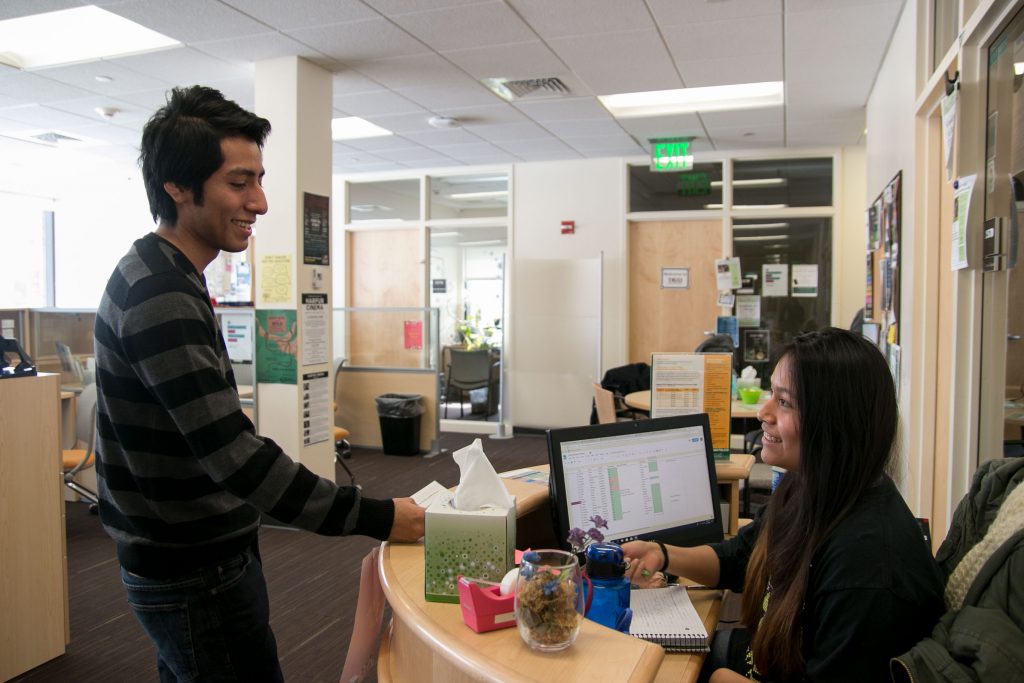
When Arleen Agama, currently a senior majoring in mathematics, was an incoming freshman, she received a letter in the mail inviting her to a summer program offered through Student Support Services (SSS). Not realizing it was free, she thought she couldn’t afford to go and put the idea aside. Speaking with an SSS counselor changed her mind.
SSS is a part of the federal TRIO programs funded by the U.S. Department of Education. SSS promotes the personal growth and academic success of not only first-generation students, but also income-eligible students and students with disabilities. Income-eligible students, for TRIO, are students who meet the low-income standard of family taxable income not exceeding 150 percent of the poverty level amount.
TRIO programs have been on Binghamton University’s campus since its first year, 1965, with the Upward Bound program. In the early 1970s, the SSS program was added. Many universities across the nation participate in federal TRIO programs to help first-generation and low-income students.
To assist in the transition to the University, the SSS Summer Program is offered to incoming students who were invited to join SSS. It is a four-week summer program in which students attend an orientation, move in early and engage in workshops.
“Through the summer program I met a lot of students,” Agama said. “Also, we went through a bunch of workshops there and they encourage us to be really active in the Binghamton community.”
According to Stephen Rebello, assistant director and academic counselor for SSS, one-third of the undergraduate student population at BU is eligible for SSS.
“Programs like ours try to level the playing field,” Rebello said. “We try to give students that information that may be missing, if they didn’t have a parent who went to college, and we try to help them make those connections so that they get the same opportunities that their peers have.”
The TRIO programs arose around the time of the civil rights movement. Legally, TRIO programs were signed into law from the Higher Education Act of 1965 under Title IV. The programs were founded to help students overcome financial, social and cultural hurdles to higher education. BU currently has six TRIO programs — Upward Bound, Upward Bound Rural Schools, Educational Talent Search, SSS, SSS—STEM and the McNair Scholars Program.
The Upward Bound, Upward Bound Rural Schools and Educational Talent Search programs focus on high school students and introducing them to higher education as a future.
According to Rebello, these programs present the students with the skills necessary for academic success in higher education and help them through the college application process. The McNair Scholars Program focuses on helping undergraduate students, with junior standing or higher, search and apply to doctoral programs. According to Rebello, the goal of the McNair Scholars Program is to introduce students of underrepresented backgrounds into Ph.D. positions and serve as inspiration for future applicants with similar backgrounds.
“I think that oftentimes, because students do well academically, the assumption is that they can excel regardless of the situation they are thrown into,” Rebello said. “But even if a student is very competent academically, there are often other struggles that people are unaware of.”
Along with academic advising, students involved with SSS also receive other services such as career coaching, personal counseling and free tutoring. To accompany these services, the office of SSS also arranges workshops and seminars. These workshops and seminars cover a multitude of topics ranging from computer literacy to time management.
Oscar Rosas, a freshman majoring in business administration, said his time at BU would be different without SSS.
“Without SSS, I wouldn’t have the friends I have right now,” Rosas said. “I’m [in the office] everyday, for hours at a time.”
Agama also felt that SSS has developed her social circle.
“I probably would’ve stayed in my room more often,” Agama said. “I would’ve not gone to as many events and I just wouldn’t have as many friends.”
According to Marty Wygmans, executive director for SSS and project director for TRIO, SSS is federally funded for a maximum of 520 students, but currently around 700 BU students use the program’s resources. The program funding enrollment cap may be why eligible students are not automatically enrolled. Each semester, the SSS office receives information on new income-eligible students from the Financial Aid Office and invites them to apply for the program. Students who wish to use the resources available from SSS must then take the initiative to apply online or at the SSS Office. If accepted, the office will provide you with a counselor to meet with and information on their programming.
“We have an office philosophy that we want to help every student that walks in our door,” Wygmans said. “Even students who aren’t eligible, we work with them until we can find a place for them so that they have advocates and people who are working with them.”
Rosas thinks that anyone who is eligible should apply.
“If you get the email, do it,” Rosas said. ”I have no regrets about joining.”


